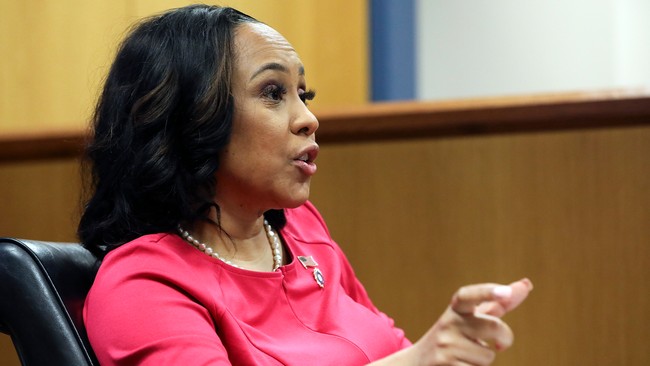We support our Publishers and Content Creators. You can view this story on their website by CLICKING HERE.

Sic semper lawfarennis. But has the attempt to prosecute a RICO case in Georgia centered on Donald Trump come to an end with Fani Willis’ disqualification? It depends on how one defines “end.”
Advertisement
Technically, as David wrote earlier, the Georgia appellate court left the indictment in place while removing Willis and Fulton County from jurisdiction over it. That came from the punt by Judge Scott McAfee that David also described, but is in itself a punt too. In fact, the appeals court barely addressed the motion in its 2-1 ruling today, and missed the larger point behind it:
2. The appellants contend that the trial court erred in denying their motions to dismiss the indictment. The State responds that the appellants have failed to show that the trial court erred in finding that the appellants had not shown “that [their] due process rights have been violated or that the issues involved prejudiced [them] in any way.”
“Dismissal of an indictment . . . [is] an extreme sanction[ ], used only sparingly . . . for unlawful government conduct.” State v. Lampl, 296 Ga. 892, 896 (2) (770 SE2d 629) (2015). In the absence of express statutory authorization, dismissal of an indictment “generally cannot be imposed absent a violation of a constitutional right.” (Citation and punctuation omitted.) Id. While this is the rare case in which DA Willis and her office must be disqualified due to a significant appearance of impropriety, we cannot conclude that the record also supports the imposition of the extreme sanction of dismissal of the indictment under the appropriate standard. See Olsen v. State, 302 Ga. 288, 293-294 (2) (806 SE2d 556) (2017); Lamb v. State, 267 Ga. 464, 465-466 (5) (479 SE2d 719) (1997). We therefore affirm the trial court’s denial of the appellants’ motion to dismiss.
Advertisement
This case didn’t just involve the appearance of impropriety. It involved actual impropriety, including factual misrepresentations during the hearing McAfee held on the disqualification motion. There are plenty of reasons to believe that both Willis and Wade lied in court about their relationship, which would not just be prosecutorial misconduct but outright perjury. A separate claim of witness tampering has yet to be pursued, but certainly raises all sorts of questions not just about the conflict of interest between Willis and Wade but also the entire conduct of the Fulton County DA throughout this case.
If perjury and witness tampering aren’t “extreme” examples of prosecutorial misconduct, what is?
The court may have felt itself constrained to the findings of McAfee’s rulings as the trier of fact on this hearing. That limitation lent itself to Judge Land’s accusation in dissent that the court had adopted a new standard for disqualification. However, the short shrift that the ruling gives the dismissal motion looks more like a punt because without Willis, this indictment is almost certainly going nowhere — and the court almost certainly knows it.
To understand why, the Associated Press gives a thumbnail description of the process that will now take place to assign new jurisdiction:
The 2-1 ruling by appeals court panel means it will be up to the Prosecuting Attorneys’ Council of Georgia to find another prosecutor to take over the case and to decide whether to continue to pursue it, though that could be delayed if Willis decides to appeal to the state Supreme Court. A trial judge in March had set conditions that allowed Willis to stay on the case.
Advertisement
Now, ask yourselves this: What prosecutor will want to take up this case at all, beyond the guilty pleas that have already been entered? That’s especially true of Willis’ Tinker-Toy edition of a RICO case, based mainly on political speech and without any permanent “organization” involved for a Racketeer Influenced or Corrupt Organization charge. Add onto that Willis’ attempts to make a racism argument in response to the DQ motion, including in a public speech at a church, and the entire mess looks distinctly unappealing, even for Democrat DAs that might otherwise be inclined to dislike Trump et al.
Do the judges know this? Probably not with total certainty, but … come on, man. They know the law and they read the indictment. They must at least suspect that no other DA will want to take this up with any real enthusiasm, and any other DA in Georgia might be inclined to quietly dismiss the RICO charges once the dust settles a bit. That includes Democrat DAs, where their constituents might be less impressed with lawfare against Trump, and their desire for re-election runs more toward dealing with actual crime rather than Politics By Other Means.
This may be premature. Both sides could appeal parts of the ruling to the Georgia state supreme court — Willis on the DQ and Trump et al on the denial of the dismissal motion. There’s no real upside for the high court to disturb this ruling, though, because it has all of the virtues of effectively killing the case while maintaining an alibi. Even CNN recognizes that this case is “dead in the water,” even before Elie Honig weighs in:
Advertisement
CNN Newsroom anchor Jim Acosta began the hour with the breaking news and brought on senior crime and justice reporter Katelyn Polantz.
“This is a big development,” said Acosta.
The appeal court’s ruling was indeed a big development, Polantz agreed, “and a big development that Donald Trump has wanted for a long time.” The case had “already been paused,” she said, but “now it’s not even back burner.”
“This is a case that will be dead in the water,” she continued, “because the Georgia Court of Appeals is now saying that Fani Willis, the leader of the prosecution against Donald Trump, the district attorney in Fulton county, Georgia, she should be disqualified from being able to bring that case.”
Honig then referred back to Willis’ public statements accusing Trump attorneys of being racist for opposing her, and wondered whether the judges would rule on that. As it happens, they didn’t:
And separately, and I’m looking to see if this is in the opinion, I believe it is, because I know it’s one of the issues that was briefed to the Georgia Court of Appeals, the D.A. made statements outside of court that the trial judge found were, quote, legally improper. For example, she went in front of a church while this case was pending, and she said, essentially, the reason these defendants have brought these motions, standard legal motions, is because they’re playing the race card.
And the defendants, Donald Trump and other defense lawyers, argued that that violated the responsibilities and ethics of a prosecutor. And the trial judge, oddly, said those statements that Fani Willis made out of court were, quote, legally improper, and then he did nothing about it. He said essentially too bad, there’s no remedy.
Advertisement
The court never even addressed these issues, which apparently surprised Honig, but comes as no surprise with this punt on dismissal. It will loom large with any new attempt to prosecute this indictment, however, since the same taint will apply thanks to Willis’ highly publicized and inflammatory remarks.

 Conservative
Conservative  Search
Search Trending
Trending Current News
Current News 







